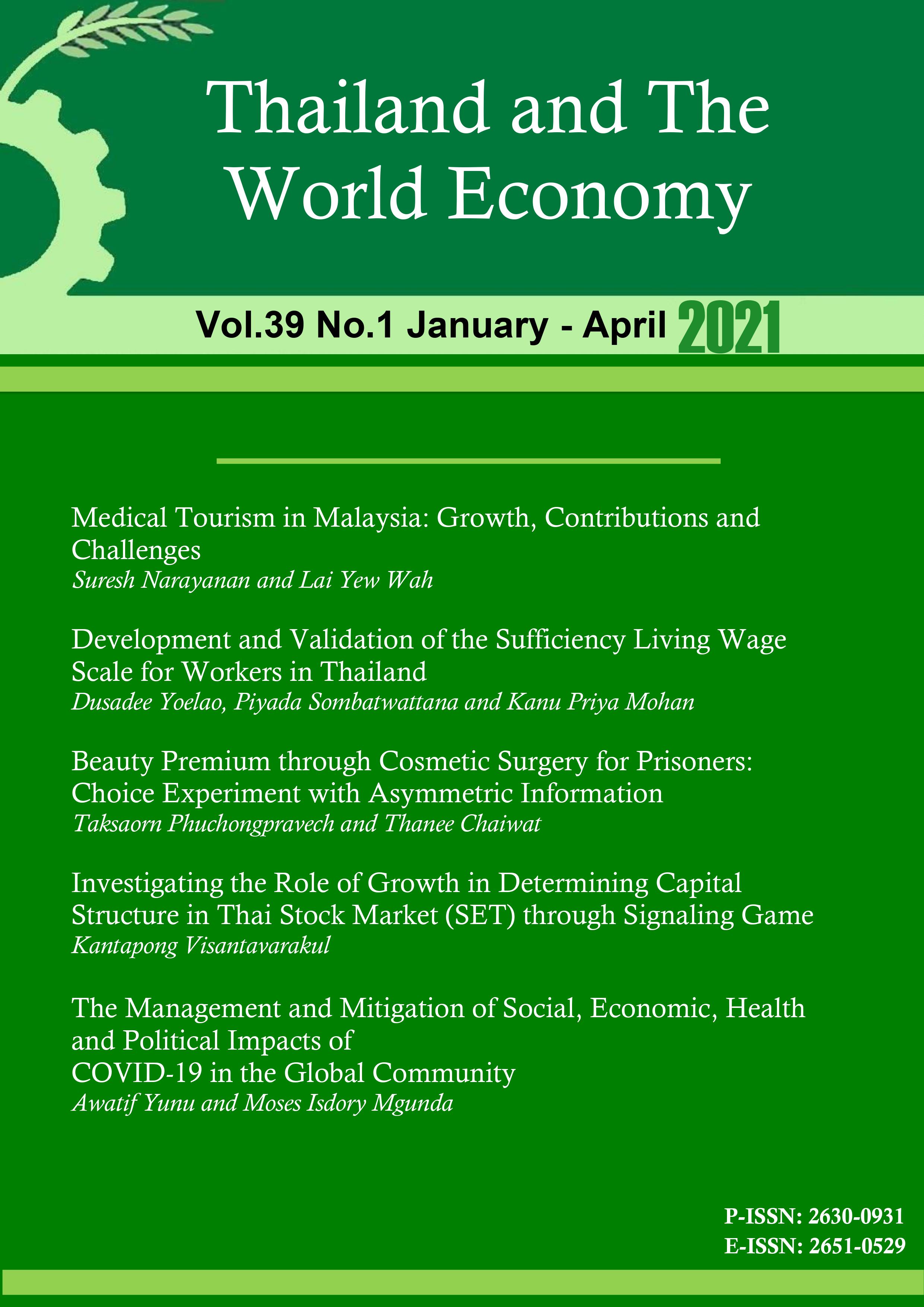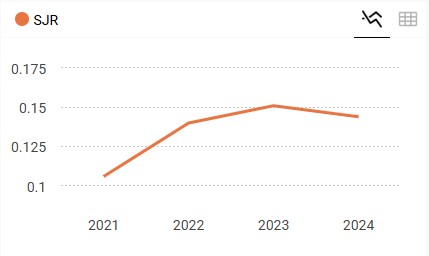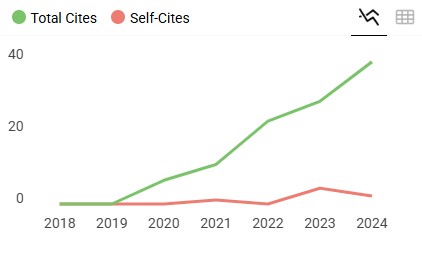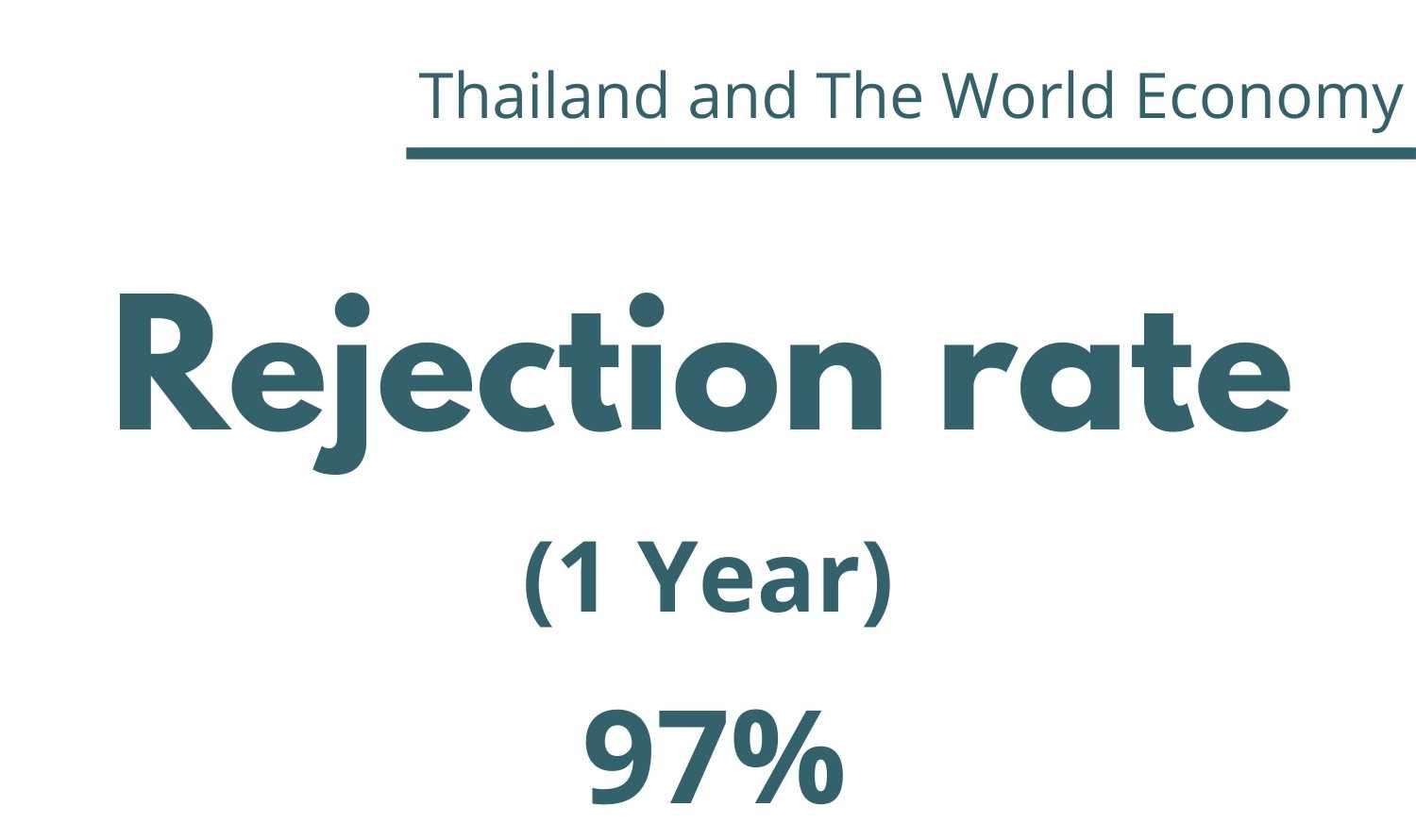Development and Validation of the Sufficiency Living Wage Scale for Workers in Thailand
Keywords:
Living Wage, Sufficiency Economy Philosophy, Thailand, scale developmentAbstract
This research presents a unique perspective about developing an instrument to measure the emerging concept of “Sufficiency Living Wage” (SLW), that was developed from the integration of “living wage” with the “Sufficiency Economy Philosophy” in Thailand, which has been the cornerstone of policies for sustainable development since 1997. The researchers formulated 2 research objectives, first to develop a scale to measure SLW, and second to examine the factor structure of this scale. A systematic scale development process entailed first a qualitative method to develop the concept of SLW, and later a quantitative development of the items of the SLW scale. The resulting SLW scale has 22-items, measured on a 5-point Likert scale. To test the psychometric properties of the SLW scale, data was collected from 428 workers in Thailand. Exploratory factor analysis was conducted, and the resultant three factors named as “perceived psychological utility”, “moderate consumption” and “living with self-immunity”. Cronbach’s alpha coefficient for the three factors was .88, .79, and .76, respectively. The emerging SLW scale has shown good psychometric properties; with an overall internal consistency of the measure (a = .89). Implications of the SLW scale are discussed for future research, and applications at workplace and policy levels.
References
Anker, R. (2011, August 31). Estimating a living wage: A methodological review. Retrieved from https://www.ilo.org/travail/whatwedo/publications/WCMS_162117/lang--en/index.htm
Boateng, G. O., Neilands, T. B., Frongillo, E. A., Melgar-Quiñonez, H. R., & Young, S. L. (2018). Best practices for developing and validating scales for health, Social, and behavioral research: A primer. Frontiers in Public Health, 6, 149.
Banaji, M. R., & Heiphetz, L. (2010). Attitudes, eds. by S. T. Fiske, D. T. Gilbert, & G. Lindzey in Handbook of Social Psychology. Hoboken, NJ, US: John Wiley & Sons Inc.
Barua, P., & Tejativaddhana, P. (2019). Impact of application of sufficiency economy philosophy on the well‐being of thai population: A systematic review and meta‐analysis of relevant studies. Journal of Population and Social Studies, 27(3), 195 - 219.
Carr, S. C., Thompson, L. F., Reichman, W., McWha, I., Marai, L., MacLachlan, M., & Baguma, P. (2012). Humanitarian work psychology: Concepts to contributions. Retrieved from http://www.siop.org/WhitePapers/
Carr, S. C., Parker, J., Arrowsmith, J., Watters, P., & Jones, H. (2016). Can a ‘living wage’ springboard human capability? An exploratory study from New Zealand. Labour & Industry: A Journal of the Social and Economic Relations of Work, 26(1), 24-39.
Curran, P. J., & West, S. G., & Finch, J. F. (1996). The robustness of test statistics to normality and specification error in confirmatory factor analysis. Psychological Methods, 1(1), 16-29.
Fabrigar, L. R., MacDonald, T. K., Wegener, D. T. (2005). The origin and structure of attitudes, eds. by. D. Albarracin, B. T. Johnson & M. P. Zanna (Eds.) in The handbook of attitudes. Mahwah, NJ: Lawrence Erlbaum.
Field, A. (2005). Discovering statistics using SPSS (2nd ed). London: Sage.
Furr, R. (2011). Core principles, best practices, and an overview of scale construction, ed. by R. Furr in The sage library of methods in social and personality psychology: Scale construction and psychometrics for social and personality psychology. London: SAGE Publications Ltd.
Gidron, Y. (2013). Scale development, eds. by M. D. Gellman & J.R. Turner in Encyclopedia of Behavioral Medicine. New York, NY: Springer.
Haar, J., Carr, S. C., Arrowsmith, J., Parker, J., Hodgetts, D., & Alefaio-Tugia, S. (2018). Escape from working poverty: Steps toward sustainable livelihood. Sustainability, 10(11), 1-14.
Hair, J. F., Black, W. C., Babin, B.J., & Anderson, R. E. (2010). Multivariate Data Analysis (7th ed). New York, NY: Pearson.
Hilgard, E. R. (1980). The trilogy of mind: Cognition, affection, and conation. Journal of the History of the Behavioral Sciences, 16(2), 107-117.
Mongsawad, P. (2010). The philosophy of sufficiency economy: A contribution to a theory of development. Asia-Pacific Development Journal, 17(1), 123-143.
Hinkin, T. R., Tracey, J. B., & Enz, C. A. (1997). Scale construction: Developing reliable and valid measurement instruments. Journal of Hospitality & Tourism Research, 21(1), 100-120.
Kaiser, H. F. (1974). An index of factor simplicity. Psychometrika, 39(1), 31-36.
Kaewruangsri, R., Niyomdecha, P., Heemhem, V., Baribhan, V., & Noknoi, J. (2018). The behavior following sufficiency economy philosophy and working life quality of oil rig workers: Case study of oil vessel company in Songkhla. Walailak Procedia, 2018(1), 1-7. [in Thai]
Kantabutra, S. (2007). Development of the sufficiency economy philosophy in the Thai business sector: Evidence, future research & policy Implications. Retrieved from http://www.sufficiencyeconomy.org/en/files/26.pdf
Kunadilokkamon, V., Buarod, B., Simavara, K., Doonlayathaveesit, N., Choonhahlai, S., & Teerathiti, N. S. (2014). The Effect of the 300 Baht Minimum Wage Policy towards Quality of Life and Welfare of the SMEs Workers in Lam Luk Ka District, Pathum Thani Province. Academic Journal Phranakhon Rajabhat University, 5(1), 118-128. [in Thai]
Lathapipat, D., & Poggi, C. (2016). From many to one: Minimum wage effects in Thailand. Retrieved from https://www.pier.or.th/wp-content/uploads/2016/08/pier_dp_041.pdf
The Living Income. (2018). Living income and the sustainable development goals (SDG's). Retrieved from https://www.living-income.com/sdg-s-and-living-income
International Labour Organization (ILO). (2019). Minimum wages: An introduction. Retrieved from https://www.ilo.org/global/topics/wages/minimum-wages/WCMS_458660/lang--en/index.htm
Meehl, P. E. (1990b). Why summaries of research on psychological theories are often uninterpretable. Psychological Reports, 66, 195–244.
Ministry of Foreign Affairs of the Kingdom of Thailand (2016). A practical approach toward sustainable development: Thailand’s sufficiency economy philosophy. Retrieved from http://thaiembdc.org/wp-content/uploads/2017/03/A_Practical_Approach_toward_Sustainable_Development.pdf
Mongsawad, P., & Thongpakde, N. (2016). Sufficiency economy philosophy: A holistic approach to economic development and mainstream economic thought. Asian Social Science, 12(7),136-142.
Nakaew, P. (2015). Impact Management on the 300 Baht Minimum Wage Policy by Small and Medium Entrepreneurs in Chonburi Province. Political Science and Public Administration Journal, 6(1-2), 93-107. [in Thai]
National Economic and Social Advisory Council (NESAC). (2007). Formulation and evaluation of sufficiency economy indicators and the economic and social report on the national performance in the direction of sufficiency economy. Bangkok: Ubon Rajthanee University.
Nelson, D. L., & Quick, J. C. (2012). Organizational behavior –science, the real world and you (8th ed). Andover: Cengage Learning.
Neubauer, B.E., Witkop, C.T. & Varpio, L. (2019). How phenomenology can help us learn from the experiences of others. Perspectives on Medical Education, 8(2), 90–97.
Nunnally, J. C. (1978). Psychometric theory (2nd ed.). New York: McGraw-Hill.
Paitoonpong, S., Akkarakul, N. & Sukaruji, C. (2005). The minimum wage-fixing system in Thailand. Thailand Development Research Institute Quarterly Review, 20(2), 3-11.
Parker, J., Arrowsmith, J., Fells, R., & Prowse, P. (2016). The living wage: Concepts, contexts and future concerns. Labour & Industry: A Journal of the Social and Economic Relations of Work, 26(1), 1-7.
Promsuk, Y. (2013). Construction Labourers’ Attitude on the Minimum Wage 300 Baht in Nakhonratchasima (Master’s Thesis). Suranaree University of Technology, Nakhonratchasima. [in Thai]
Robbins, S. P., & Judge, T. A. (2012). Organizational Behavior (15th ed). New York, NY: Prentice Hall.
Robeyns, I. (2005). The capability approach: A theoretical survey. Journal of Human Development, 6(1), 93–117.
Rosenberg, M. J., & Hovland, C. I. (1960) Cognitive, affective and behavioral components of attitudes, eds. by M. J. Rosenberg & C. I. Hovland in Attitude organization and change: An analysis of consistency among attitude components. New Haven: Yale University Press.
Royal Thai Government. (October 28, 2016). From the Sufficiency Economy Philosophy to Sustainable Development Goals. Retrieved from http://www.thaigov.go.th /index.php/th/speech-2/item/108481-108481
Sen, A. (1989). Development as capability expansion, eds. by S. Fukuda-Parr and A.K. Shiva Kumar in Readings in Human Development. New York: Oxford University Press.
Sen, A. (1993). Capability and well-being. In M. Nussbaum & A. Sen (Eds.), The quality of life (pp. 30-53). Oxford: Oxford University Press
Slavec, A., & Drnovsek, M. (2012). A perspective on scale development in entrepreneurship research. Economic and Business Review for Central and South - Eastern Europe, 14(1), 39-62.
Stevens, J. P. (1992). Applied multivariate statistics for the social sciences (2nd ed). Hillsdale, NJ: Erlbaum.
The Living Income. (2018). living income and the sustainable development goals (SDG's). Retrieved from https://www.living-income.com/sdg-s-and-living-income
Thurstone, L.L. (1947) Multiple factor analysis: A development and expansion of vectors of the mind. Chicago, IL: University of Chicago Press.
United Nations. (2016). Sustainable development goals: 17 goals to transform our world. Retrieved from http://www.un.org/sustainabledevelopment/sustainable-development-goals/
Vonkglam, S., Thuvanuti, P., & Panirindra, B. (2017). The impact of minimum wage policy management of the textile and garment industry in the Bangkok metropolitan and vicinity. VRU Research and Development Journal Humanities and Social Science, 12(3), 297-309. [in Thai]
Watkins, M. W. (2018). Exploratory factor analysis: A guide to best practice. Journal of Black Psychology, 44(3), 219–246.
Wibulswasdi, C., Piboolsravut, P. & Pootrakool, K. (2012). Sufficiency economy philosophy and development (5th ed). Bangkok: The Crown Property Bureau.
Yao, C. Parker, J. Arrowsmith, J., & Carr, S. C. (2017). The living wage as an income range for decent work and life. Employee Relations, 39(6), 875-887.
Yoelao, D., Mohan, K. P., & Sombatwattana, P. (2019). A qualitative construction of sufficiency living wage in Thailand based on the sufficiency economy philosophy. International Perspectives in Psychology: Research, Practice, consultation, 8(4), 227–239.










